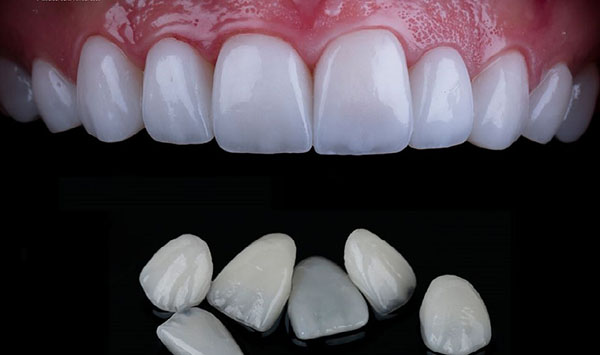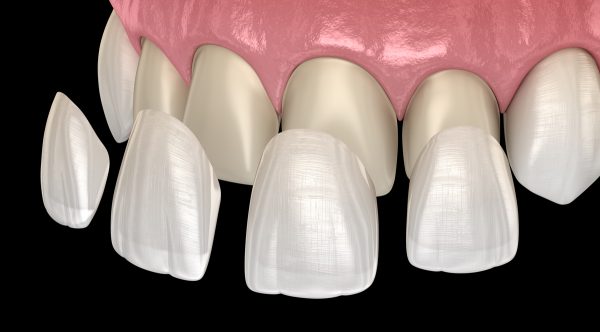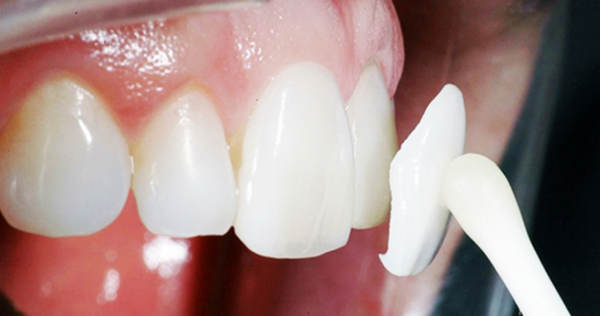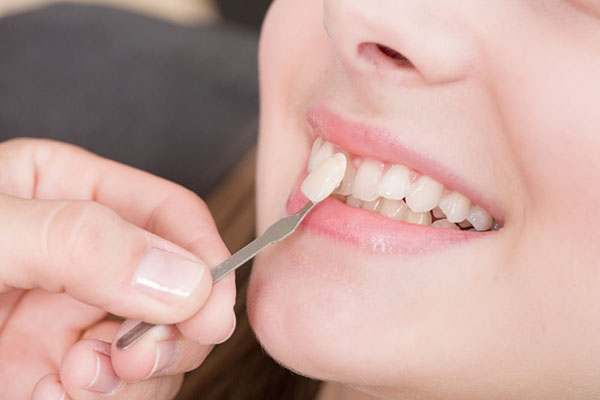Is it painful to get Porcelain Veneers? Cost, Process and Lifespan
Porcelain Veneers are a cosmetic dental solution that helps to overcome dental problems such as sparse teeth, dull teeth, chipped teeth, tooth decay, etc. At the same time, they also enhance our ability to chew. The process of Porcelain Veneers is very quick, with the help of local anesthetics, so you will not feel any pain or discomfort. However, if you do the service at an unreliable address, you will face many dangerous complications.
Contents
- 1 Understanding the method of Porcelain Veneers
- 2 Are Porcelain Veneers good?
- 3 Is it painful to get Porcelain Veneers? What are the influencing factors?
- 4 The main types of Porcelain crown
- 5 The process of conducting Porcelain Veneers
- 6 Possible complications after getting Porcelain Veneers
- 7 Notes on how to avoid complications of Porcelain Veneers process
Understanding the method of Porcelain Veneers
Porcelain Veneers are a method of restoring the chewing function and aesthetics of the teeth by using a porcelain crown to cover the damaged part of the real tooth.
This is the ideal solution for cases of chipped teeth, sparse teeth, mild protrusions or underbites or antibiotic discoloration.
During the process of Porcelain Veneers, the dentist will grind the original tooth as a pillar, then take an impression of the jaw to create an exact copy of the damaged tooth and that is the porcelain crown.
The process requires precision and high technique to ensure that the Porcelain teeth have the right shape and color with the other teeth in your jaw.

Are Porcelain Veneers good?
According to doctor Nguyen Anh Ngoc (Home Dental), Porcelain Veneers method is a very popular cosmetic dental restoration method, which can improve the shape, color and function of teeth.
Therefore, it can be said that this is a good cosmetic dental method that at the same time can bring many different benefits such as improving the appearance of the teeth, protecting the original teeth, having high durability …
Improve tooth appearance
Each Porcelain tooth will be made to match the color and shape of the original teeth, making them even and whiter.
In addition, Porcelain teeth are also shaped and edited to suit the specific appearance requirements of each person, so after you are done, you will own a more beautiful and harmonious set of teeth.
Improving the appearance of teeth with Porcelain Veneers will become a driving force for users to increase their confidence and improve their own quality of life.
Protects teeth from corrosion and damage
Not only is it aesthetically pleasing, Porcelain Veneers also protect the original tooth from corrosion and damage by creating a protective layer on the outside of the tooth.
The Porcelain material used to cover the root tooth will help prevent contact of the tooth with acidic, hard or potentially corrosive foods.
Moreover, for cases where teeth have been decayed, chipped or worn, this is an extremely optimal solution.
Accordingly, after completing the treatment of the above problems, dentists often recommend people to take Porcelain Veneers because it helps protect weak teeth from the strong impact of chewing food and bacteria in the oral cavity.
Improve chewing function
Porcelain crowns work to improve chewing function by creating a new, stronger tooth surface. From there, they will improve your ability to bite and crush food and reduce difficulties when eating.
A study published in “The Journal of Prosthetic Dentistry” in 2014 found that Porcelain Veneers significantly improved the chewing function of users.
In the study, researchers followed 40 people for six months after they had Porcelain Veneers. The results showed that everyone had significantly improved chewing ability and comfort when eating.

Durable
The average lifespan of Porcelain crowns is from 5 to 15 years, even up to 20 years for high-class Porcelain crowns or if you know how to clean and eat carefully.
With such durability, good chewing capacity, during use, you can completely eat and drink hard foods comfortably.
Of course, if we want Porcelain teeth to last for a long time, we still need to limit eating such kinds of food often.
Anti-stain, anti-plaque
Unlike real teeth, Porcelain crowns have much better resistance to staining and plaque, especially for Porcelain teeth made from modern porcelain materials such as zirconia, leucite porcelain or lithium disilicate.
That will help the porcelain crown always be bright, white, and not change color for a long time.
Is it painful to get Porcelain Veneers? What are the influencing factors?
Dr. Ngoc shared that, although teeth need to be sharpened during the process of Porcelain teeth, patients will not feel too much pain or discomfort during the procedure thanks to the support of local anesthetics and current machines.
Maybe after the anesthetic wears off, you will feel a little bit of tooth sensitivity within 2-3 days due to the invasive effect during the procedure.
A study published in the journal “Clinical Implant Dentistry and Related Research” in 2014 assessed people’s pain and discomfort levels after Porcelain crowns. In that study, researchers followed 75 people for 24 hours after they had Porcelain crowns.
The results showed that most people (86.7%) felt no pain within 24 hours of Porcelain Veneers and only a few (13.3%) experienced mild or moderate pain.
In addition, the above study also pointed out that the factors that affect the pain after Porcelain teeth are the quality of the Porcelain crown, the doctor’s skill, the equipment – the machine and the location of the worker.

Quality porcelain teeth
Porcelain teeth, when fixed on real teeth, will exist in the oral cavity in contact with soft tissue such as gums, tongue …
If they are genuine Porcelain teeth which are tested for quality and manufactured with absolute precision, you can rest assured that you can eat and chew normally, without worrying about complications or pain occurring.
In contrast, poor quality or incorrectly crafted Porcelain teeth will be the cause of many problems, including prolonged pain.
The bacteria and impurities on the Porcelain crown will quickly penetrate the tooth bone. In the long run, Porcelain crowns oxidize, corrode the roots of the teeth, causing inflammation of the mouth.
Dentist’s skills
In dentistry, the dentist is always the decisive factor to the success of all treatment and cosmetic dentistry. So whether Porcelain crowns are painful, beautiful or not depends on the dentist’s performance.
The dentist is the one who closely follows the customer from the diagnostic stage, grinding teeth, taking impressions, making Porcelain crowns. Just a small deviation can make the whole treatment process go down the drain.
Typically, improper tooth grinding and incorrect calculation of the ratio of Porcelain teeth are the two most serious mistakes, giving rise to painful feelings for customers. As follows:
- Grinding teeth too small causes serious invasion of dentin, affecting the inner pulp, thereby producing a long-lasting sensation of sensitivity and numbness.
- If the design of Porcelain teeth does not match with the real teeth, when inserted, it will not fit together. The act of straightening, pressing dentures against real teeth will cause pain and discomfort.
Equipment and machinery
There are more and more modern dental machines and equipment that make the Porcelain coating process faster, less painful and more aesthetically pleasing.
It can be said that machinery and equipment have greatly determined the success of a Porcelain cosmetic surgery.
In order to manufacture a perfect proportion Porcelain tooth to fit snugly on real teeth, the dental unit needs to apply CAD/CAM software and an advanced jaw impression machine. On the contrary, if done with outdated and primitive techniques, there will be many potential errors. The pain or risks, complications are inevitable.
Patient’s conditions
Not everyone has good pain tolerance and this can greatly affect the perception of each person during the process of Porcelain Veneers.
For people with sensitive oral conditions, poor pain tolerance, of course they will feel very uncomfortable, even a lot of pain after Porcelain teeth.
On the contrary, for people with good pain tolerance and non-sensitive teeth, the impact during the process is insignificant.
The main types of Porcelain crown
Thanks to the outstanding development of modern dentistry, there are many different types of Porcelain crown on the market.
But basically they are divided into two main types: metal Porcelain crowns and complete Porcelain crowns.
Metal Porcelain crowns
Metal Porcelain crowns are Porcelain crowns manufactured with an inner metal frame, usually titanium alloy or Cr-Co alloy, while the outside is still bright white porcelain layers.
The strength of metal Porcelain crown is high durability, meeting functional requirements such as chewing, speaking and anti-corrosion. In addition, they are more affordable than complete Porcelain crowns.
However, this type of crown is lighter in color than real teeth, easily exposed to black shadows when illuminated with light. Therefore, they are not suitable for the positions of incisors and canines because these are all teeth that are easily exposed when smiling or talking.
In addition, metal Porcelain teeth also have another minus point that after a few years of use, oxidation will occur, causing black gums.
Complete Porcelain crown
Complete Porcelain crowns are Porcelain crowns without a metal layer in the inner frame, made from monolithic porcelain.
This type of porcelain teeth is manufactured with almost absolute precision, ensuring high thinness and durability, allowing optimal similarity with real teeth in terms of shape, color, clarity and reflectivity. .
The strength of complete Porcelain crowns is aesthetics. Its brightness and color are more similar to real teeth than metal Porcelain teeth, so it is often used for incisors and fifth teeth.
In addition, complete Porcelain crowns are more resistant to color and plaque than metal Porcelain ones, making them easier to be cleaned.
However, the cost of complete Porcelain crowns is higher than that of metal Porcelain crowns, so many people are reluctant to use them.
The process of conducting Porcelain Veneers
In order to ensure the results of the restoration as well as to limit the risks and complications, Porcelain Veneers process will be carried out according to the following steps:
Step 1: Examination and consultation: The doctor will check the oral condition and assess the suitability for Porcelain crowns. The doctor will also advise the customer on the types of crown and technology that suit the customer’s condition best.
Step 2: Oral hygiene, preparation of the pulp: Before starting the process of Porcelain Veneers, the doctor will ask to clean the customer’s teeth and prepare the tooth pulp. That helps ensure the Porcelain teeth are covered on a clean and dry tooth surface.
Step 3: Take dental impressions: After grinding the teeth, the doctor will take impressions of the teeth to serve the process of making Porcelain crowns.
Step 4: Install temporary teeth: After taking impressions, the doctor will put a plastic temporary tooth on the base of the tooth. Temporary teeth help protect your teeth until the crown is completed.
Step 5: Processing Porcelain teeth: Based on the customer’s tooth impression information, the technician will create a Porcelain crown. The processing of Porcelain teeth must be performed by experienced technicians to ensure that the Porcelain teeth are created accurately and beautifully.
Step 6: Create Seal Protect film to protect dentin and install permanent teeth: Finally, after the Porcelain teeth are designed, the doctor will proceed to make Seal Protect film to protect dentin and install permanent teeth.
Possible complications after getting Porcelain Veneers
The Porcelain Veneers process is not too complicated, but even the smallest deviation can cause many complications and pain.
Complications that can occur after porcelain veneers if you do it at an unreliable dental address are sensitive teeth, pain, open ankles, receding gums…

Sensitive and painful teeth for days
Manifestations: After teeth grinding, customers feel dull pain all day or a lot of sensitivity when chewing. At the end of the Porcelain Veneers process, when eating hot food, cold food, spicy food or tough food, an uncomfortable feeling appears, and the pain spreads to the root of the tooth.
Cause: The doctor grinds the teeth too deeply, damages the dentin, or uses poor quality porcelain crowns, poor bearing capacity.
The neck of the tooth is open, the gums recede
Manifestations: The porcelain crown is exposed, the black color inside can easily be observed. The gums are corroded, getting smaller and smaller, sometimes there is inflammation, pain, swelling and redness.
Cause: Porcelain crowns are too short to fit the gums. Porcelain crown is sloppily crafted, rubbing against the gums and scratch, bleed, and wear down the gums. Inappropriate chewing activities, chewing in the wrong position, grinding teeth cause the Porcelain crown to be pressed tightly against the gum line, pushing the gums upward. The worst case is that the neck of the tooth is open because the Porcelain crown is rejected, unable to integrate with the surrounding soft tissue, so it is gradually shaken, separating the real tooth.
Pulp necrosis
Manifestations: Loose Porcelain teeth, pain when eating and chewing, pain is not relieved but increasingly obvious. Chewing and biting is difficult.
Cause: Poor porcelain crown material. Customers have weak muscles and allergies to metal materials in Porcelain teeth. Bad dental care after Porcelain Veneers indirectly causes gum diseases such as tooth decay, tooth abscess, gingivitis,… If not treated early, definitively, the tooth decay can erode the tooth’s neck, tooth pulp and spread to the whole mouth.
Misaligned bite
Manifestation: The shape of the denture is larger or smaller than the teeth on the jaw. Porcelain teeth are loose and uncertain. The jaws do not close tightly together in the resting position.
Cause: Frequent chewing concentrated in the position of the crown, deviating the jaw arch (low side, high side). The shape of the processed Porcelain teeth is not uniform with the rest of the teeth. The technique of installing Porcelain teeth is wrong.
To overcome the above complications, you should quickly contact a good dentist for timely treatment, do not wait for the disease to heal or buy medicine for yourself.
Notes on how to avoid complications of Porcelain Veneers process
Complications after Porcelain Veneers are easy to occur and persist if we are subjective from the very beginning.
To ensure absolute safety, we need to pay attention to issues such as only doing it when needed, taking proper care of porcelain teeth, choosing a reputable dental address and having regular oral health checks. .
Only have Porcelain Veneers when needed
The technique of Porcelain Veneers is the most effective treatment for severely stained teeth that cannot be repaired, chipped teeth, wide teeth, slightly crooked teeth because this is a method to help teeth have a beautiful white color, standard shape, and cover the deviation of the teeth.
As for the case of severely sparse tooth structure, protruding or underbite due to jaw bone, Porcelain Veneers are not the optimal solution.
Besides, Porcelain Veneers directly affect the original tooth structure due to tooth grinding. Therefore, dentists always advise us to only perform Porcelain Veneers when absolutely necessary.
Take care of porcelain teeth
After getting Porcelain Veneers, you need a special oral care regimen to avoid complications and preserve your teeth for a long time.
- Instead of just brushing twice a day as before, now we need to combine rinsing after each meal, flossing to clean between teeth, using a toothpaste with less chemical bleach.
- Regarding the diet, you should give up the habit of chewing hard, chewy things such as gnawing on chicken feet, chewing bone cartilage, eating marshmallows, peanut candies, etc. Limit intake of foods and drinks with colored or dark colors like sauces, chili sauce, chili powder, coffee or smoking.
- Say NO to carbonated drinks, which are easy to corrode enamel like beer, wine, syrup…
- Try to chew evenly on both sides of your teeth.
- Wear a mouthguard while you sleep if you have teeth grinding.
Choose a safe and reputable dental address
The rate of successful Porcelain Veneers cases at reputable dental addresses is almost absolute. In contrast, fraudulent dental addresses with outdated facilities, unlicensed doctors, no warranty, poor quality Porcelain crowns… often have many cases of damaged Porcelain crowns.
Therefore, the risk during and after porcelain coating is very large if customers put their trust in the wrong place. Therefore, you need to prioritize reputable dental clinics.
Regular dental health check
In order for our teeth to be healthy, we need to have regular dental check-ups every year as recommended by the Ministry of Health. The appropriate frequency of visits is every 6 months or may be earlier depending on needs.
At each dental visit, the dentist will remove harmful plaque and thoroughly clean the mouth to kill bacteria, then check the teeth, check the condition of the porcelain teeth… If abnormal signs are detected, the doctor will appoint the customer for early treatment, preventing danger.
With the information shared above, it must have helped you understand very well about Porcelain Veneers service. Home Dental performs Porcelain Veneers services according to a closed process with a team of qualified doctors, assistants and machines, committed to completely overcoming the disadvantages of tooth shape, bringing a bright smile, ideal bite, and safety for all customers.
